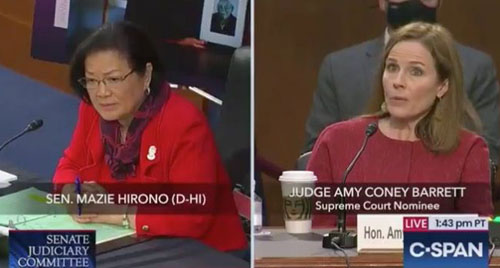Analysis by WorldTribune Staff, October 15, 2020
Hawaii Democrat Sen. Mazie Hirono during Wednesday’s confirmation hearing scolded Supreme Court nominee Amy Coney Barrett for her use of the term “sexual preference.”
 “Let me make clear: sexual preference is an offensive and outdated term,” Hirono said.
“Let me make clear: sexual preference is an offensive and outdated term,” Hirono said.
“If it is your view that sexual orientation is merely a preference … then the LGBTQ community should be rightly concerned whether you would uphold their constitutional right to marry,” Hirono told Barrett. The senator insisted she thought it was “not an accident” that Barrett used the term.
The preferred term is “sexual orientation.”
Hirono later tweeted that the term sexual preference “is used by anti-LGBTQ activists to suggest that sexual orientation is a choice. It is not. Sexual orientation is a key part of a person’s identity.”
So, then Hirono must also be concerned that Democrat presidential candidate Joe Biden might not uphold the LGBTQ community’s constitutional right to marry, right?
On several occasions during the presidential campaign, Biden has used the term “sexual preference.”
In May, Biden promised to “rebuild the backbone of this country, the middle class, but this time bring everybody along regardless of color, sexual preference, their backgrounds.”
Justice Ruth Bader Ginsburg used the term “sexual preference” in 2017. Dianne Feinstein, the ranking Democrat on the Senate Judiciary Committee, also used it in 2017. Judiciary Committee Democrat Sens. Dick Durbin and Richard Blumenthal have used the term during speeches on the Senate floor.
An LGBTQ-rights advocate used the term last month in an interview with The Advocate.
Following Wednesday’s Barrett confirmation hearing, Merriam-Webster Dictionary changed its general listing for “preference,” adding an “offensive” warning before the part listing “sexual preference.”
“The term preference as used to refer to sexual orientation is widely considered offensive in its implied suggestion that a person can choose who they are sexually or romantically attracted to,” the dictionary added in extra guidance of usage.
The dictionary confirmed the change was made because of the Senate hearing.
“We released the update for sexual preference when we noticed that the entries for preference and sexual preference were being consulted in connection with the SCOTUS hearings,” Merriam-Webster’s editor-at-large, Peter Sokolowski, told Fox News.
Intelligence Brief __________ Replace The Media
